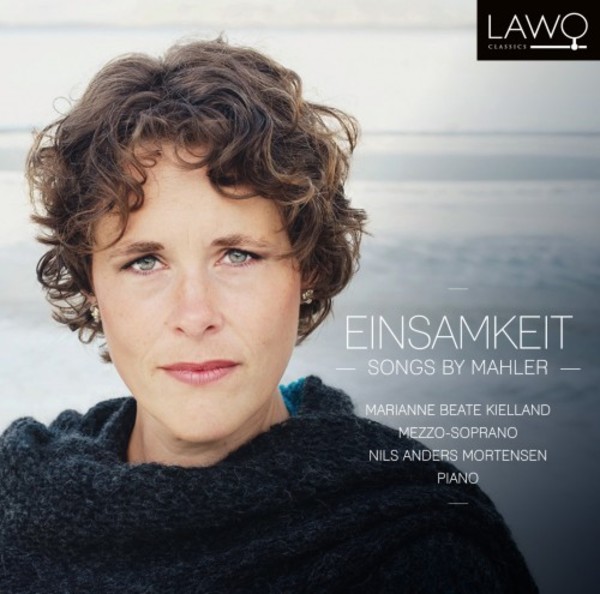
Einsamkeit: Songs by Mahler
£13.25
In stock - available for despatch within 1 working day
Despatch Information
This despatch estimate is based on information from both our own stock and the UK supplier's stock.
If ordering multiple items, we will aim to send everything together so the longest despatch estimate will apply to the complete order.
If you would rather receive certain items more quickly, please place them on a separate order.
If any unexpected delays occur, we will keep you informed of progress via email and not allow other items on the order to be held up.
If you would prefer to receive everything together regardless of any delay, please let us know via email.
Pre-orders will be despatched as close as possible to the release date.
Label: Lawo Classics
Cat No: LWC1157
Format: CD
Number of Discs: 1
Genre: Vocal/Choral
Release Date: 24th August 2018
Contents
Artists
Marianne Beate Kielland (mezzo-soprano)Nils Anders Mortensen (piano)
Works
KindertotenliederLieder eines fahrenden Gesellen (Songs of a Wayfarer)
Ruckert-Lieder (5)
Artists
Marianne Beate Kielland (mezzo-soprano)Nils Anders Mortensen (piano)
About
Where does this leave the piano version? Are these ‘mere’ piano reductions? One might ascribe commercial reasons for their creation: in Mahler’s own time, a reduced arrangement was the only way the works could be heard outside of the concert hall, and a piano reduction would be the easiest to sell. This, however, would give far too little credit to the pieces. In fact, the attention to detail given in them shows that they were written to be performed as equals in either form. After all, since it would be in this form that most people would have the opportunity to hear them, it was important that these versions were as strong as they could possibly be.
The classical music magazine Gramophone wrote of Marianne Beate Kielland: “The mezzo-soprano is quite outstanding: strong, firm, sensitive in modulations, imaginative in her treatment of words, with a voice pure in quality, wide in range, and unfalteringly true in intonation.”
Kielland studied at the Norwegian Academy of Music with Svein Bjorkoy. Her other teachers have included Oren Brown and Barbara Bonney. Considered today one of Europe’s leading singers, she performs regularly on major concert stages in Europe, America and The East. Among the conductors with whom she has performed are Philippe Herreweghe, Fabio Biondi, Jordi Savall, Rinaldo Alessandrini, Christophe Rousset, Marc Minkowski, Masaaki Suzuki, Thomas Dausgaard, Juanjo Mena, Jos van Immerseel, Robert King, Andrew Manze, Daniel Reuss and Rune Bergmann.
In 2012 she received a Grammy nomination in the category of ‘Best Classical Vocal Solo’ for her recording of “Veslemoy Synsk” by the composer Olav Anton Thommessen. With nearly fifty other albums in addition to a demanding concert schedule, Marianne Beate Kielland is established as an exceptional performer with a wide-ranging repertoire from baroque to contemporary.
Together with pianist Nils Anders Mortensen she has released seven earlier recordings on the LAWO Classics label. In 2015 she released “Pasketid” (LWC1077) with violinist Elise Batnes and organist Kare Nordstoga, and in 2017 she released “Terra Nova” (LWC1125) with composer and pianist Jan Gunnar Hoff.
“The songs of Gustav Mahler have haunted me for 20 years. These are songs that you begin to take in, hum along to, and listen to early in your studies. See them lie far yonder, like a glimpse of the Grail. To sing these songs – nay, to dare sing them – is indeed a challenge.
“But the day came, at least for me, when Mahler’s songs suddenly were part of the repertoire. And the more I perform them, the more they grow into me. They feel as they are a part of me now, and I hope that I shall continue to sing this wonderful repertoire for a long, long time.
“Why is this record titled Einsamkeit? Mahler has not chosen the lightest lyrics for his music, which must partially reflect his own situation. How lonely it must be not to find a life partner, or to lose your own children! And even if the Rückert songs contain some bright and beautiful moments, there is still much existentialism in Ich bin der Welt and Um Mitternacht.
“Enjoy! I hope you will come to love these songs as much as I do.”
Error on this page? Let us know here
Need more information on this product? Click here